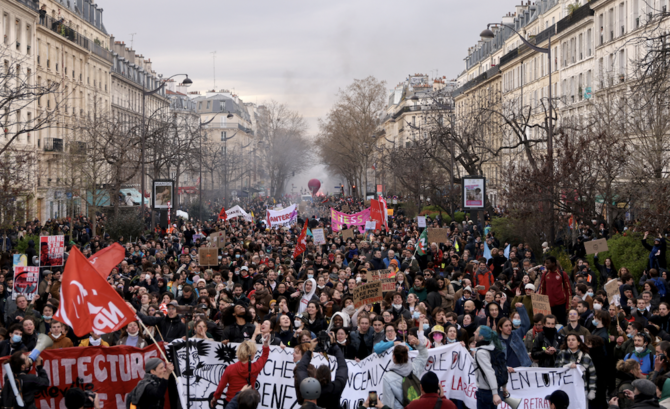Zaid M. Belbagi
It has been decades since France’s 17th-century Palais-Royal has been under such heavy guard. However, in circumstances unique to France’s very particular republic, the royal building has been surrounded by police and armored vehicles — for it hosts France’s Constitutional Council.
France’s highest constitutional authority has been the center of attention this week as protests wracked the country on the 12th day of rage in a year that has seen significant political turbulence.
Established by the Constitution of the Fifth Republic to ensure its basic principles are upheld, the council has a role central to French democracy. Usually a discreet body, the council no doubt carries out the important work of ruling whether proposed statutes conform with the constitution after they have either been voted on by the parliament or, as in the case of current pension reforms, passed by the government as a decree.
Over its lifespan, the council has reviewed 744 bills and struck down 369, only 17 of them completely. Currently headed by former Prime Minister Laurent Fabius, the council’s members, known as les sages or “the wise,” have a significant influence on new legislation. Only when they have made their ruling can new proposals be signed into law by the president of the republic.
Their task on Friday was to decide if the pension reform and the process through which the legislation was passed is in line with the constitution, and if a referendum can be held on the retirement age.
Given the lack of parliamentary majority for the president’s Renaissance party following elections last year, the proposed reforms to France’s pensions system have faced significant opposition from the outset. Bolstered by significant social unrest, and despite the reforms having been passed in France’s Senate, the president’s would-be allies and political opponents alike in the National Assembly withheld their critical support, leading the government to employ Article 49.3 of the French Constitution and compel the majority to adopt its proposals.
Friday’s ruling had been keenly anticipated, as within the context of French President Emmanuel Macron’s centrist alliance losing its parliamentary majority, a no confidence vote, and already having used special constitutional powers to pass the 2023 budget — the government was on shaky ground.
Having approved the most controversial element of the proposal, namely the raising of the retirement age, the council’s work is far from over. An 11th-hour proposal from the opposition on Thursday requesting a referendum on the reforms was resubmitted in the hope of stalling matters. However, given that the court has announced it will take several weeks to review this latest proposal, it is more likely that the president will see his reforms become law within a fortnight.
The president said that he would meet with relevant trade unions on Tuesday regardless of Friday’s outcome. Though this meeting is still expected to take place, several trade unions have announced they will not be attending. Rather, France is likely to see more protests. Following the court’s decision, far-left leader, Jean-Luc Melenchon, said “the fight will continue” — setting France up for further turmoil. On Friday, the headquarters of the leading French luxury group LVMH was stormed and protesters clashed with police across the country.
France’s socialist opposition have made sure not to criticize the council’s decision, sharing that its decision was a legal one though this issue has become a wider societal problem in which the majority of the French people are in opposition and therefore to promulgate this law in haste would be undemocratic. The leaders of the conservative Les Republicains have belatedly supported the reforms following the council’s decision. Though they have advocated for the raising of the retirement age, they have been hesitant to extend their support to a government that has undermined their previous electoral success.
France’s unions will be issuing a statement concerning the reforms and will continue to advocate for a decision on a referendum that is expected on May 3. In the interim, Macron can expect further political upheaval, which Friday’s legal decision will not have discouraged. His Prime Minister Elisabeth Borne has said that “there are no winners or losers” from the ruling, echoing a wider sentiment in the country regarding the controversial reforms. In circumstances where the cost of France’s aging population and outdated generous public spending must be reviewed, it is little surprise that the government has already stated the reforms will become law by September. Nevertheless, in a country where welfare spending is sacred, the president will face a very tough remaining four years of his presidency should his reforms come into effect.







